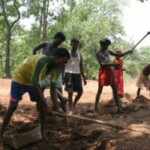Evegeniya Anisimova With a budget of $7.47 billion in 2017-18, India’s National Rural Employment Guarantee Scheme (NREGS) is one of the largest programs of its kind globally. The program guarantees employment for up to 100 days per year for each rural household, with wages equal for men and women. Thus, it not only serves as a form of [Read More...] Source: IFPRI South Asia Office
How can safety nets reduce violence against women in Bangladesh?
Direct cash transfers coupled with behaviour change communication (BCC) can reduce violence against women inflicted by their partners by more than a quarter, according to a study. The study said the reduction in violence was found six to 10 months after the intervention ended, providing the first evidence that such benefits can be sustained by […] Source: IFPRI Bangladesh Country Office
A Catch-22 in Safety Net Targeting in Bangladesh
A Bureaucratic Catch-22: Study in Bangladesh Shows How Safety Nets Can Overlook the Poorest Around the world, governments and development partners make hard choices on how to invest their limited resources to help the needy. But in a country like Bangladesh, where almost one fourth of the population of 165 million lives below the poverty line, […] Source: IFPRI Bangladesh Country Office
Leveraging Social Protection for Improved Nutrition
Child stunting–that is, when children are too short for their age–is a serious issue. It is a consequence of inadequate nutrition and health, which reduce the chance that children will develop well, do well in school, earn a good living, and escape poverty. Although stunting in Bangladesh has dropped a lot over the past two […] Source: IFPRI Bangladesh Country Office
Complementarities between social protection and health care policies: Evidence from the Productive Safety Net Program in Ethiopia
A presentation on "Complementarities between social protection and health care policies: Evidence from the Productive Safety Net Program in Ethiopia" was given by Kalle Hirvonen



